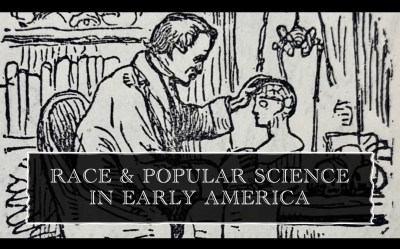
Rachel Walker discusses race and science in early America, using archival images pertaining to phrenology and physiognomy to discuss the ways these techniques were used to prop up existing social hierarchies, and also to subvert them.

Rachel Walker discusses race and science in early America, using archival images pertaining to phrenology and physiognomy to discuss the ways these techniques were used to prop up existing social hierarchies, and also to subvert them.
Join Dr. Rachel Walker as she recounts how reading a curious passage in the Anglo-African Magazine, which she found in the archives of the Library Company of Philadelphia, led to her research on race and science in early America, and more specifically, the nineteenth-century sciences of phrenology and physiognomy.
Professor Walker uses images from the archives of member institutions such as the Library Company of Philadelphia and The Huntington Library to illustrate how phrenology and physiognomy were used by both scientists and laypeople in the nineteenth century. Although we often rightly associate these techniques with pseudo-scientific ways of supporting racist and sexist social hierarchies, Dr. Walker shows us how Black scientists and laypeople also used these sciences to forward their own assertions of Black excellence and genius.
Dr. Walker shows us how scientists and the many Americans who read and talked about phrenology and physiognomy used facial angles, head shapes, and other measurements of the face and skull to make judgments and predictions about friends, family members, strangers, business partners, and ultimately, entire groups of people. She emphasizes the need to understand these practices—even though we now reject them as pseudo-sciences—because they tell us a lot about how nineteenth-century individuals understood their social world and the people with whom they interacted on a daily basis.
Questions or comments about this event or others like it? Let us know.
To cite this content, please use footnote:
"Race & Popular Science in Early America," Consortium for History of Science, Technology and Medicine, August 17, 2021, https: www.chstm.org/video/124.

Assistant Professor of History, University of Hartford
Rachel Walker specializes in the history of gender, race, and popular science in early America. She is currently working on her first book project, which uncovers the history of physiognomy: a once-popular but now-discredited science, rooted in the idea that people's facial beauty reveals their moral and mental character. In 2018, Dr. Walker received her PhD from the University of Maryland in College Park.
The Consortium's collections provide many opportunities to learn more about the history of phrenology, physiognomy, and race and science in the nineteenth century.
Our cross-instiutional search tool allows researchers to investigate materials across multiple institutions from a single interface. With more than 4.4 million catalog records of rare books and manuscripts, the Consortium's search hub offers scholars and the public the ability to identify and locate relevant materials.
George Combe Papers, American Philosophical Society
Samuel George Morton Papers, American Philosophical Society
John Alden Mason Papers, American Philosophical Society
Phrenology, or The doctrine of the mental phenomena, by J.G. Spurtzheim, New York Academy of Medicine
Fowler's practical phrenology: giving a concise, elementary view of phrenology, by O.S. Fowler, College of Physicians of Philadelphia
Physiognomy and craniology; or, A manual of phrenology, by J.D.L. Zender, Library Company of Philadelphia
Phrenology vindicated, and antiphrenology unmasked, by Charles Caldwell, Library Company of Philadelphia
The science of physiognomy, theoretical and practical, by John Spon, Wellcome Collection
The pocket Lavater, or The science of physiognomy, by Johann Caspar Lavater, Johns Hopkins University
How to read faces; or, Practical physiognomy made easy, by James Coates, Yale University
Walker, Rachel. "Facing Race: Popular Science and Black Intellectual Thought in Antebellum America, by Rachel Walker," Early American Studies: An Interdisciplinary Journal 19:3 (Summer 2021), pp. 601-40.
Dorin Smith, Fictional Brains: Reflecting on the Neural Subject in the Nineteenth-Century American Novel
David Korostyshevsky, Disciplining the Drunkard: The Medico-Legal History of Habitual Drunkenness in Nineteenth-Century America
Kathrinne Duffy, Doctrine of the Skull: Phrenology and Public Culture in Antebellum America
Timothy Minella, By Their Locks You Shall Know Them: Race, Science, and Hair in the Nineteenth Century
© 2025 Consortium for History of Science, Technology and Medicine | Copyright Infringement